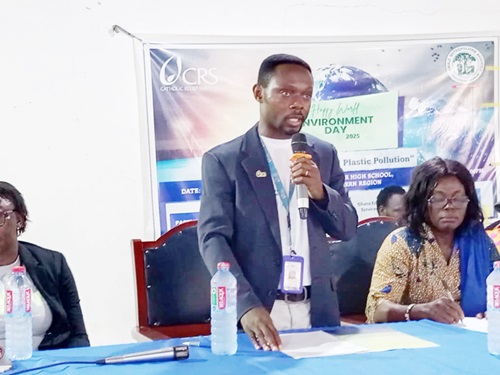Catholic Relief Services (CRS) Ghana has called for an urgent and collective action to end plastic waste pollution in the Tamale Metropolis and beyond.
The Programme Director of Water, Sanitation and Hygiene (WASH) at CRS Ghana, Festus Fofie, who made the call described it as a growing environmental and public health hazard threatening lives and sustainability of cities.
He said the situation was compounded by limited access to sanitation infrastructure and weak enforcement of environmental regulations, putting thousands at risk — particularly children and vulnerable populations.
"Plastic pollution poses a severe and growing threat to our environment, our health and the sustainability of our cities and villages.”
“Tamale is facing serious challenges from open defecation to poorly maintained public toilets and rampant plastic waste, all of which pose a risk to public health and the environment," he stressed.
Event
Mr Fofie made the call at an event to commemorate this year’s World Environment Day in Tamale, on the theme: "Ending Plastic Pollution".
![]()
A section of the participants
It brought together traditional authorities, government agencies, sanitation actors, students and civil society stakeholders to raise awareness of the urgent need to tackle plastic pollution and promote sustainable water, sanitation and hygiene (WASH) services.
The event formed part of CRS’s “Enhancing Access to Safely Managed WASH Services in Greater Tamale (Safe WASH)” project — a three-year initiative implemented in partnership with Woord en Daad and GMB, with support from the Tamale Metropolitan Assembly (TaMA), Perfsan, Ghana Education Service (GES) and other local stakeholders.
Successes
In his remarks, Mr Fofie pointed out that CRS’s interventions were helping to bridge sanitation gaps in the metropolis.
He indicated that so far, the Safe WASH project had facilitated the construction of over 1,000 household latrines, benefitting more than 5,200 residents.
Additionally, 72 handwashing stations have been installed in schools, and three plastic waste collection and buy-back centres have been set up, removing and recycling over 50,000 kilogrammes of plastic waste.
He announced the formation of 10 school WASH clubs with 198 trained peer educators, and the training of four sanitation entrepreneurs and four sales agents to supply affordable WASH products in communities.
"Thirteen sanitation by-laws have been reviewed, two new regulations introduced, and a sanitation revolving fund launched in collaboration with iDE Ghana to support low-income households and entrepreneurs in improving access to sanitation," he said.
Mr Fofie stressed that systemic reform must go hand-in-hand with behavioural change at the community level to achieve lasting results in waste management.
Collaboration
The Deputy Director of Finance and Administration at the Tamale Metropolitan Directorate of the GES described the plastic waste situation as dire and called for stronger engagement from all stakeholders to tackle the menace.
“The current state of plastic pollution in our communities is worrying.
Our environment is under siege, and so is the health of our people — especially children who are most vulnerable.”
“We must work together to change mindsets and create innovative, environmentally friendly solutions at both school and household levels," he said.
Rev. Adongo advised the public to reduce the use of single-use plastics and to fully participate in plastic waste reduction campaigns to ensure a healthier and cleaner environment.
“World Environment Day is not just symbolic — it is a reminder that protecting our planet begins with us,” she emphasised.
Writer's email: mohammed.fugu@graphic.com.gh

